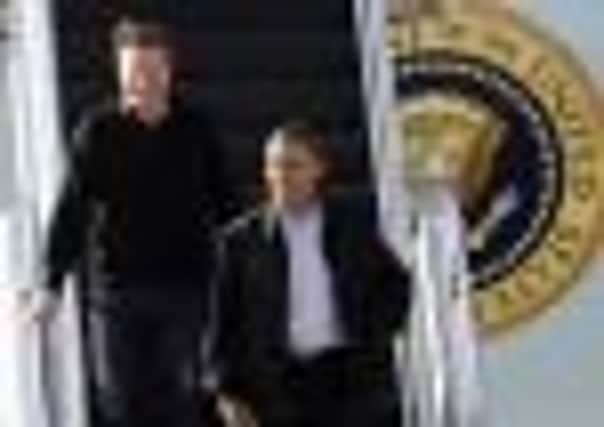David Cameron and Barack Obama pledge to curb soaring petrol prices


Prime Minister David Cameron and President Barack Obama have agreed the two nations will dip into their oil reserves to keep a cap on prices as the rising cost of fuel hits drivers on both sides of the Atlantic.
Speculation about the talks alone was enough to bring the price of Brent crude down by $3 a barrel yesterday to $124.
Advertisement
Hide AdAdvertisement
Hide AdBut it became clear that the two men felt they needed to act as fuel price hikes continue to threaten to push up inflation and the cost of living.
The US price of a gallon of petrol has hit a record $2.40 while in the UK, diesel is up to almost 146p a litre.
Speaking in New York, Mr Cameron said: “We are all facing the problem of higher oil prices and that translates into the cost of filling up the family car, which is very high here in the US but frankly even higher in the UK.
“I want to try to help British families, just as Barack Obama wants to help American families. We didn’t reach a decision yesterday about oil reserves but we discussed the issue and it is important that we do what we can to try to help families who are trying to make their family budgets add up.”
Mr Cameron will hope that the intervention will take the pressure off Chancellor George Osborne who is due to announce his budget on Wednesday.
Mr Osborne, who briefly joined the president and Prime Minister in the White House talks, has been criticised for not doing more to keep the cost of fuel down despite taking 1p off a litre last year and cancelling planned future tax rises, a move he controversially funded with a £10 billion raid on North Sea oil revenue.
The issue of fuel costs is a major one in the forthcoming US presidential election and Mr Obama quickly turned on his opponents after news of his agreement leaked out.
He accused Republican presidential hopefuls of playing politics over high fuel prices, and mocked them for resisting developing alternative energy sources.
Advertisement
Hide AdAdvertisement
Hide AdMr Obama, whose re-election bid could be harmed by voter resentment and opponents’ criticisms over increasing pain at the pump, insisted there was no “quick fix” or “silver bullet”.
“And anyone who tells you that isn’t really looking for a solution, they’re trying to ride the political wave of the moment,” the president claimed.
In what has been billed as a highly successful trip to the US by Mr Cameron, the move on tackling fuel costs appears to be the most substantial agreement between the two men.
Mr Cameron also revealed that he discussed the recent tensions over the Falkland Islands with Mr Obama during their talks at the White House yesterday.
The Prime Minister said Mr Obama made clear that the US was content with the islands remaining a British overseas territory.
Argentina has revived the dispute over the islands it calls the Malvinas as the 30th anniversary of the war approaches.
As he visited the site of Ground Zero in New York yesterday, Mr Cameron was asked whether he was concerned about Washington’s approach to the issue. He replied: “We discussed the issue briefly yesterday. I wanted to stress how important it is for Britain to set out how clearly we support the right of the Falkland Islanders to determine their own future.
“They want to remain with us and that is very clear.
“The US position is that they support the status quo, they don’t argue against the status quo and that is very welcome. They are content with the status quo, they are not challenging the status quo.
Advertisement
Hide AdAdvertisement
Hide Ad“To me it is very important that we stick up for the right of self-determination. People in the Falkland Islands want to continue with their current status.
“What I wanted to do in this 30th anniversary year is send a very clear signal to the rest of the world – Argentina and others – that while the Falkland Islanders want that status, Britain will help them keep that status.”
But their talks were dominated by withdrawal from Afghanistan by 2014, how to tackle the Assad regime in Syria and how to stop Iran obtaining nuclear weapons.
Yesterday, there was more pressure on the two men over Afghanistan as President Karzai demanded Nato troops stopped patrols following the massacre of 16 villagers by a rogue American soldier.
The visit is in stark contrast to the cold reception Mr Cameron received in 2010 when he first arrived in Washington as Prime Minister. The two men, who have both been facing fierce criticism for the foreign policy and lack of friends abroad from opponents, have underlined that the old special relationship between Britain and the US is now the “essential relationship”.
Mr Cameron said he had been “bowled over” by the warmth of the reception he received from Mr Obama during his two days in Washington.